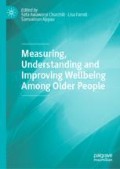Abstract
This chapter examines the discourse on the relationship between culture and wellbeing of elderly persons, based on ethnographic study of accused witches in northern Ghana. The authors find that elderly people are mostly accused of witchcraft and are violently banished from their communities to live in witch camps; this has serious negative impacts on their wellbeing. The chapter therefore problematizes and examines the aspects of cultural practices and discourses that legitimize such ill-treatment of elderly persons. The authors also discuss implications for policy, government and other agencies working with the elderly to improve their wellbeing.
Access this chapter
Tax calculation will be finalised at checkout
Purchases are for personal use only
References
Ashforth, A. (1998). Witchcraft, violence, and democracy in the New South Africa [Sorcellerie, violence et démocratie dans la Nouvelle Afrique du Sud]. Cahiers d’études Africaines, 505–532.
Baba, I. M. (2013). Life in a witch camp. Experiences of residents in the Gnani Witch Camp in Ghana (Master’s thesis, The University of Bergen).
Byrne, C. (2011). Hunting the vulnerable: Witchcraft and the law in Malawi. Consultancy Africa Intelligence, 16.
Comaroff, J., & Comaroff, J. L. (1999). Occult economies and the violence of abstraction: Notes from the South African postcolony. American Ethnologist, 26(2), 279–303.
Comaroff, J., & Comaroff, J. L. (2000). Millennial capitalism: First thoughts on a second coming. Public Culture, 12(2), 291–343.
Crampton, A. (2013). No peace in the house: Witchcraft accusations as an “old woman’s problem” in Ghana. Anthropology & Aging Quarterly, 34(2), 199–212.
De Certeau, M. (1984). The practice of everyday life translated by Steven Rendall. Berkeley and Los Angeles: University of California Press.
Eboiyehi, F. A. (2017). Convicted without evidence: Elderly women and witchcraft accusations in contemporary Nigeria. Journal of International Women’s Studies, 18(4), 247–265.
Evans-Pritchard, E. E. (1937). Witchcraft, oracles and magic among the Azande. Oxford: The Clarendon Press.
Gaskill, M. (2010). Witchcraft: A very short introduction (vol. 228). Oxford University Press.
Geschiere, P. (1997). The modernity of witchcraft: Politics and the occult in postcolonial Africa. Charlottesville and London: University of Virginia Press.
Ghana, Action Aid. (2008). The state and condition of alleged witches in Northern Region of Ghana. Accra: ActionAid Ghana.
HelpAge International. (HAI, 2010). Discrimination against older women in Burkina Faso. Parallel report submitted to the 47th session of the Committee on the Elimination of All Forms of Discrimination against Women (CEDAW) in relation to Burkina Faso’s Sixth periodic report of States parties, CEDAW/C/BFA/6, October 2009.
Igwe, L. (2016). Do not close down ‘witch camps’ in Northern Ghana. Accessed from http://www.modernghana.com/news/713689/do-not-close-down-witch-camps-in-northern-ghana.html on the 5th of November 2016.
Jesen, S., & Buur, L. (2004). Everyday policing and the occult: Notions of witchcraft, crime and ‘the people’. African Studies, 63(2), 193–211.
Mabefam, G. M. (2019). Witchcraft and the paradox of development: Contesting the category of the non-modern. Unpublished Ph.D. thesis submitted to the University of Melbourne.
Machangu, H. M. (2015). Vulnerability of elderly women to witchcraft accusations among the Fipa of Sumbawanga, 1961–2010. Journal of International Women’s Studies, 16(2), 274–284.
Mair, L. (1969). Witchcraft. New York: McGraw-Hill Book Company.
Mavhungu, K. (2012). Witchcraft in post-colonial Africa: Beliefs, techniques and containment strategies. African Books Collective.
Miguel, E. (2005). Poverty and witch killing. The Review of Economic Studies, 72(4), 1153–1172.
Monter, W. (2010). The scourge of demons: Possession, lust and witchcraft in a seventeenth-century Italian convent. By Jeffrey R. Watt, Journal of Interdisciplinary History 40, 605–606.
Onyinah, O. (2002). Deliverance as a way of confronting witchcraft in modern Africa: Ghana as a case history. Asian Journal of Pentecostal Studies, 5(1), 107–134.
Parish, J. (1999). The dynamics of witchcraft and indigenous shrines among the Akan. Africa, 69(3), 426–447.
Parrinder, G. (1958). Witchcraft, a critical study of the belief in witchcraft from the records of witch hunting in Europe yesterday and Africa today. Harmondsworth: Penguin Books.
Schubert, V., & Mabefam, M. (Forthcoming). A comparison of contemporary perceptions of witchcraft in the west and Africa.
Tayo, S. (2010). An analytical assessment of the Konkomba Belief in witchcraft and the institutionalised witchcraft at Gnani (Yendi Municipality): A challenge to Christianity. Unpublished long essay. Cape Coast: University of Cape Coast.
Thompson, E. P. (1971). The moral economy of the English crowd in the eighteenth century. Past & Present, 50, 76–136.
Turner, V. (1967). Betwixt and between: The liminal period in rites of passage. In V. Turner (Ed.), The Forest of Symbols (93–111). Ithaca, NY: Cornell University Press.
Van der Geest, S. (2002). From wisdom to witchcraft: Ambivalence towards old age in rural Ghana. Africa, 72(3), 437–463.
Wolfe, M. (1997). Changing identities in early modern France. Duke University Press.
Author information
Authors and Affiliations
Corresponding author
Editor information
Editors and Affiliations
Rights and permissions
Copyright information
© 2020 The Author(s)
About this chapter
Cite this chapter
Mabefam, M.G., Appau, S. (2020). Witchcraft Accusations and the Social Exclusion of the Elderly in Northern Ghana: Understanding How Cultural Discourses and Practices Affect the Wellbeing of the Elderly. In: Awaworyi Churchill, S., Farrell, L., Appau, S. (eds) Measuring, Understanding and Improving Wellbeing Among Older People. Palgrave Macmillan, Singapore. https://doi.org/10.1007/978-981-15-2353-3_9
Download citation
DOI: https://doi.org/10.1007/978-981-15-2353-3_9
Published:
Publisher Name: Palgrave Macmillan, Singapore
Print ISBN: 978-981-15-2352-6
Online ISBN: 978-981-15-2353-3
eBook Packages: Economics and FinanceEconomics and Finance (R0)

